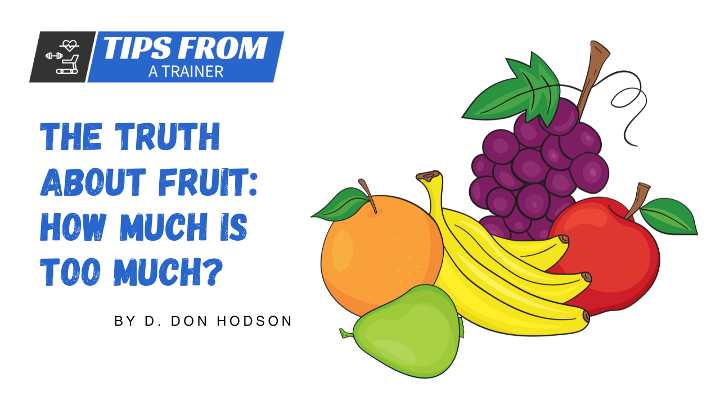Introduction
Unveiling the Debate Over Fruit Consumption
The topic of fruit consumption has sparked a lively debate within the realm of nutrition and health. On one hand, fruits are celebrated for their rich array of vitamins, minerals, and antioxidants that contribute to overall well-being. On the other hand, concerns have arisen about the sugar content present in fruits and its potential impact on health, particularly in the context of modern dietary patterns. This ongoing discussion prompts us to delve deeper into the complexities of fruit consumption, unraveling its benefits and addressing potential considerations to arrive at a comprehensive understanding.
Balancing Health Benefits and Nutritional Concerns
The allure of fruits lies in their innate capacity to provide essential nutrients that support bodily functions. From vitamin C to potassium, fruits encompass a diverse spectrum of bioactive compounds that play pivotal roles in promoting health. However, a spotlight has been cast upon the sugar content found naturally in fruits, and questions have emerged about the implications of excessive sugar consumption for metabolic health. Striking a balance between harnessing the health benefits of fruits and acknowledging nutritional concerns is at the heart of the discourse surrounding fruit consumption.
Purpose of the Article
Amidst the cacophony of opinions, this article seeks to provide a comprehensive examination of fruit consumption. By exploring the intricate tapestry of nutrients present in fruits, scrutinizing their sugar content, and evaluating their impact on health, we aim to equip readers with an evidence-based understanding of the role that fruits play in the context of a balanced diet. With a focus on clarity and scientific rigor, this article endeavors to shed light on the truth about fruit consumption, allowing individuals to make informed dietary choices that align with their wellness goals.
Table of Contents
Introduction
Unveiling the Debate Over Fruit Consumption
Balancing Health Benefits and Nutritional Concerns
Purpose of the Article: A Comprehensive Examination of Fruit Consumption
The Nutritional Value of Fruits
The Diversity of Nutrients in Fruits
Dietary Fiber: A Cornerstone of Fruit's Nutritional Profile
Vitamins, Minerals, and Phytochemicals: Nature's Bounty
The Sugar Content in Fruits
Natural vs. Added Sugars: Understanding the Difference
Fructose and Glycemic Index: How Fruits Affect Blood Sugar
Impact on Insulin Resistance and Health Risks
Portion Control and Moderation
The Concept of Portion Sizes for Fruits
Tailoring Fruit Consumption to Individual Needs
Strategies for Avoiding Overconsumption
Health Benefits of Fruit Consumption
Nutrient-Rich Superstars: Fruits and Disease Prevention
Antioxidants and Immune Support
Gut Health and Digestive Benefits
Potential Concerns and Considerations
Allergies and Sensitivities to Fruits
Impact on Weight Management and Energy Intake
Dental Health and Acid Erosion
The Role of Fruit in Different Lifestyles and Dietary Plans
Fruit in Various Dietary Patterns: Vegan, Paleo, Keto, and More
Athletes and Active Individuals: Fueling Performance with Fruits
Balancing Fruit Consumption in Weight Loss and Maintenance
Conclusion
Navigating the Sweet Spectrum: Making Informed Fruit Choices
The Truth About Fruit: A Path to Balanced Nutrition and Health

The Nutritional Value of Fruits
The Diversity of Nutrients in Fruits
Fruits are nature's bounty, offering a remarkable variety of nutrients that contribute to overall health. Vitamins, minerals, and antioxidants abound in these colorful edibles, each playing a distinct role in maintaining bodily functions. Vitamin C, for instance, is a potent antioxidant that supports the immune system and aids in collagen synthesis. Potassium, another essential nutrient found in fruits, assists in regulating blood pressure and fluid balance. By incorporating a spectrum of fruits into one's diet, individuals can access a comprehensive array of nutrients that collectively contribute to well-being.
Dietary Fiber: A Cornerstone of Fruit's Nutritional Profile
Among the nutrients that fruits provide, dietary fiber stands as a cornerstone of their nutritional profile. Fiber is crucial for digestive health, promoting regular bowel movements and preventing constipation. Soluble fiber, found in fruits like apples and berries, contributes to a feeling of fullness and helps regulate blood sugar levels. Insoluble fiber, prevalent in fruits like kiwi and pear, aids in maintaining a healthy gut environment by supporting the growth of beneficial bacteria. The presence of dietary fiber in fruits not only aids in digestion but also plays a role in weight management and disease prevention.
Vitamins, Minerals, and Phytochemicals: Nature's Bounty
The treasure trove of nutrients found in fruits extends beyond the realm of vitamins and minerals. Phytochemicals, bioactive compounds present in plants, offer a plethora of health benefits. For instance, flavonoids found in citrus fruits possess antioxidant properties that protect cells from oxidative damage. Carotenoids, such as beta-carotene in carrots and lycopene in tomatoes, support eye health and have been associated with a reduced risk of chronic diseases. The presence of these diverse compounds in fruits adds to their nutritional value and underscores their role in promoting long-term well-being.
The Sugar Content in Fruits
Natural vs. Added Sugars: Understanding the Difference
Fruits are naturally sweet due to their inherent sugar content. Unlike added sugars, which are incorporated during food processing, the sugars present in fruits come bundled with a package of essential nutrients and dietary fiber. This natural composition influences how our bodies metabolize and respond to fruit sugars. Unlike processed foods laden with added sugars, fruits bring to the table a unique synergy of nutrients that contribute to their healthful profile. It's important to distinguish between these natural sugars and the added sugars that are linked to various health concerns.
Fructose and Glycemic Index: How Fruits Affect Blood Sugar
Among the natural sugars found in fruits, fructose is a prominent player. Fructose is metabolized differently than glucose, another type of sugar. The glycemic index (GI) is a measure of how quickly a food raises blood sugar levels. Most fruits have a low to moderate GI due to their fiber content, which slows down the absorption of sugars. This natural buffer helps prevent rapid spikes in blood sugar levels. However, the GI can vary depending on factors such as ripeness and preparation methods.
Impact on Insulin Resistance and Health Risks
Concerns have been raised about the potential impact of fruit consumption on insulin resistance, a condition where cells become less responsive to insulin's signal. While some studies suggest that very high fruit consumption may affect insulin sensitivity, the overall body of evidence indicates that moderate fruit intake is generally well-tolerated and does not contribute significantly to insulin resistance. It's important to note that whole fruits, with their inherent nutrients and fiber, have a different metabolic impact compared to foods high in added sugars.
Portion Control and Moderation
The Concept of Portion Sizes for Fruits
Portion sizes play a pivotal role in achieving a balanced and healthful diet. When it comes to fruits, moderation is key. The recommended daily intake of fruits varies depending on factors such as age, sex, and level of physical activity. As a general guideline, a serving of fruit is typically considered to be one medium-sized fruit (e.g., apple, banana), half a cup of chopped fruit, or three-quarters of a cup of 100% fruit juice. Adjusting portion sizes based on individual energy needs and health goals is essential to prevent overconsumption.
Tailoring Fruit Consumption to Individual Needs
Individual nutritional needs can differ significantly, and this holds true for fruit consumption as well. Athletes and individuals with higher energy expenditure may have greater flexibility in their fruit intake. Those with specific health conditions, such as diabetes, may need to monitor their carbohydrate intake, including that from fruits. Age-related factors also come into play, as elderly individuals may benefit from fruits' nutrient density to support overall health. Consulting a registered dietitian or healthcare professional can help tailor fruit consumption to individual requirements.
Strategies for Avoiding Overconsumption
While fruits offer an array of health benefits, excessive consumption can contribute to an overabundance of calories and sugars. Strategies to avoid overconsumption include practicing mindful eating, being attentive to portion sizes, and opting for whole fruits over fruit juices or sugary snacks. Incorporating a variety of fruits in the diet can prevent monotony and provide a diverse spectrum of nutrients. Additionally, incorporating fruits as part of balanced meals can help control the overall impact on blood sugar levels. Taking these precautions can allow individuals to enjoy the nutritional perks of fruits while maintaining a healthful intake.
Health Benefits of Fruit Consumption
Nutrient-Rich Superstars: Fruits and Disease Prevention
Fruits are natural powerhouses of essential nutrients, making them valuable allies in the fight against various diseases. Their abundant vitamin and mineral content, such as vitamin C, potassium, and folate, contributes to overall health and well-being. For instance, vitamin C acts as an antioxidant, protecting cells from damage, and supporting the immune system. Potassium helps regulate blood pressure and fluid balance. Additionally, folate is crucial for cell division and is particularly important for pregnant women to prevent birth defects. The collective presence of these nutrients, along with phytochemicals like flavonoids and carotenoids, enhances fruits' potential in disease prevention.
Antioxidants and Immune Support
Fruits stand as a rich source of antioxidants, compounds that neutralize harmful molecules known as free radicals. Free radicals can damage cells and contribute to chronic diseases, including cancer and cardiovascular disorders. By providing antioxidants, fruits assist in maintaining cellular integrity and reducing the risk of oxidative stress-related ailments. Furthermore, antioxidants play a vital role in supporting the immune system, helping the body combat infections and illnesses. Incorporating a variety of colorful fruits into the diet ensures a diverse spectrum of antioxidants with various health benefits.
Gut Health and Digestive Benefits
The dietary fiber found abundantly in fruits serves as an essential fuel for gut health. Fiber supports regular bowel movements, preventing constipation and promoting a healthy digestive system. Moreover, certain types of dietary fiber act as prebiotics, nourishing beneficial gut bacteria. A balanced gut microbiome is linked to various aspects of health, including immune function, mental well-being, and metabolism. By promoting gut health and maintaining a thriving microbiome, fruits contribute to an overall sense of vitality and wellness.
Potential Concerns and Considerations
Allergies and Sensitivities to Fruits
While fruits offer an array of health benefits, some individuals may experience allergies or sensitivities to specific fruits. These reactions can range from mild itching or hives to more severe symptoms like anaphylaxis. Common allergens include certain tree fruits like apples, peaches, and cherries. Cross-reactivity between pollen and certain fruits can also trigger allergies in individuals with pollen allergies. Being aware of potential allergies and seeking medical advice if symptoms arise is crucial to prevent adverse reactions.
Impact on Weight Management and Energy Intake
Fruits contribute valuable nutrients to the diet, but their calorie content and sugar load should be considered, especially for those focused on weight management. While fruits' natural sugars are accompanied by fiber and nutrients, excessive consumption can lead to an excess of calories. Monitoring overall calorie intake, portion sizes, and balancing fruit consumption with other nutrient-rich foods is key for achieving and maintaining a healthy weight. For individuals with specific weight-related goals, consulting a registered dietitian can provide personalized guidance.
Dental Health and Acid Erosion
The acidity present in certain fruits can have implications for dental health. Acids in fruits, such as citric acid, can erode tooth enamel over time, potentially leading to cavities and dental sensitivity. To minimize the risk of acid erosion, it is advisable to consume fruits as part of a meal, rather than as standalone snacks. Chewing sugar-free gum or drinking water after consuming acidic fruits can help neutralize acids and promote saliva production, aiding in tooth remineralization.
The Role of Fruit in Different Lifestyles and Dietary Plans
Fruit in Various Dietary Patterns: Vegan, Paleo, Keto, and More
The role of fruit varies across different dietary patterns, each with distinct goals and principles. In vegan diets, fruits often serve as vital sources of essential nutrients, including vitamin C and dietary fiber, which can be limited in plant-based diets. Fruits also complement the principles of the paleo diet by offering natural sources of energy and nutrients. However, in ketogenic (keto) diets, which emphasize low carbohydrate intake, fruit consumption is often restricted due to its sugar content. It's important for individuals to consider their chosen dietary pattern and tailor their fruit intake accordingly to align with their nutritional objectives.
Athletes and Active Individuals: Fueling Performance with Fruits
For athletes and those engaged in regular physical activity, fruits provide a source of easily digestible carbohydrates that can help fuel workouts and replenish glycogen stores post-exercise. The natural sugars in fruits provide a quick energy source, while vitamins and minerals support optimal muscle function and recovery. Including fruits in pre- and post-workout meals and snacks can contribute to improved exercise performance and overall athletic well-being.
Balancing Fruit Consumption in Weight Loss and Maintenance
Fruits can be a valuable ally in weight loss and maintenance efforts, provided they are consumed mindfully. Their high fiber and water content contribute to satiety, helping individuals feel fuller for longer periods. As part of a balanced diet, fruits can replace high-calorie, nutrient-poor snacks, reducing overall calorie intake. However, individuals should be cautious about portion sizes and choose lower-calorie fruits when focusing on weight loss. Balancing fruit consumption with other nutrient-dense foods and monitoring total calorie intake remains crucial for achieving and sustaining weight-related goals.
Conclusion
Navigating the Sweet Spectrum: Making Informed Fruit Choices
In the journey to optimal health and nutrition, understanding the nuances of fruit consumption is key. By navigating the complex interplay between the nutritional value, sugar content, and individual needs, individuals can make informed choices about incorporating fruits into their diets. Recognizing the diversity of nutrients, the benefits of antioxidants, and the importance of portion control equips readers with the tools needed to strike a harmonious balance in fruit consumption.
The Truth About Fruit: A Path to Balanced Nutrition and Health
Embracing the truth about fruit consumption empowers individuals to embark on a path of balanced nutrition and well-being. Armed with knowledge about the nutritional value, potential concerns, and practical strategies for incorporating fruits, readers can confidently make decisions that align with their health goals. By embracing fruits as an integral part of a diverse and balanced diet, individuals can unlock the benefits of their nutrient richness while mitigating potential drawbacks, ultimately paving the way to a healthier and more fulfilling life.

Don Hodson, Certified Personal Trainer
I'm Don, an ACE-certified personal trainer and the founder of Tips From A Trainer. With my passion for fitness and years of experience, I've helped countless individuals transform their physiques!
Having personally overcome weight challenges throughout my life, I understand the struggle. Through consistency, exercise, and a balanced diet, I have managed to stay in shape and I want to share my message with the world!
The fitness industry is fraught with misconceptions and deceptive practices, which is why I am committed to providing you with the truth.
- My Site: www.Don-Hodson.com
- My Company: www.ConnectedAgeMarketing.com

The Truth About Fruit